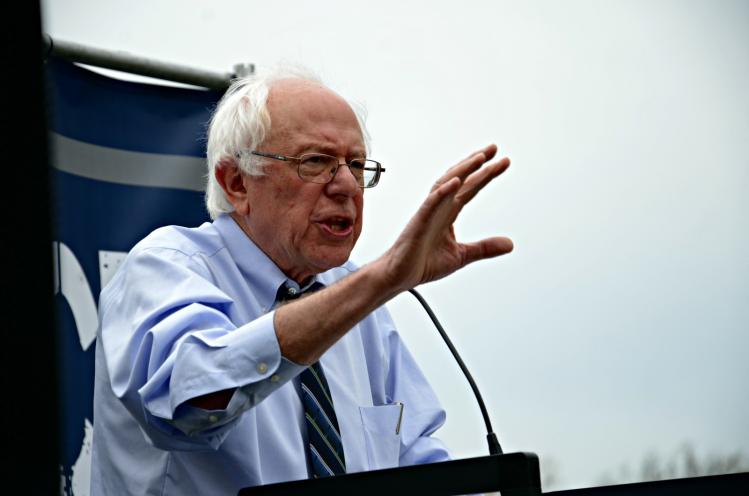
Bernie Sanders is running for president. The long-time Senator from Vermont, a political independent and self-declared socialist, will challenge Hillary Clinton for the Democratic nomination. Sanders is an experienced politician, articulate and strategically smart enough to get a lot of free media attention. Clinton fans should not be alarmed. Followers of Sanders’s career and visitors to his website know that he is less interested in criticizing his Democratic rival than in raising basic issues of economic injustice, inequalities of power, and the need for democratic policies but even more for democratic practices -- on the part of everyone.
Sanders has always been a democratic socialist, convinced that democracy -- rule of and by and for the people -- must be economic and social as well as political. Democracy requires what political scholar Harry Boyte calls “public work”: engaged citizens taking their full share of responsibility for the common good. When they do so, socialists are convinced, they will find that socialism is the best way to organize the political economy even if, as Oscar Wilde * once said, it will require a lot of meetings.
Pundits and late-night comedians will have great fun with a socialist in the race; the mock horror of amused guests will be played against the possibly genuine horror of America’s new plutocrats. But instead of simply laughing off Sanders and his socialism, consider this short primer.
Socialism has three meanings. One is public ownership, known to us via the post office, city buses and subways, municipal utilities, state and national parks, a few government- owned businesses, like Amtrak, and at least one state-owned bank. The idea here is that there are some resources so important that they should not be subject to competition and market manipulation. Instead, they should be controlled by the public through the instruments of democratic government. As in the private sector, bureaucracy and bad management, most notably at the level of boards of directors, sometimes lead to inefficiency and corruption. The solution on both fronts is engaged, committed, and creative citizens, including government-employed professionals, dedicated to the common good.
The second and perhaps best known form of socialism is public provision of services to meet basic human needs. Thus the label “socialized medicine” for the healthcare systems of Canada, the United Kingdom, and other countries. We have such a system for the elderly, with Medicare, and for military veterans, but we have shied away from a sensible “single-payer” system. In many other countries there is enough sense of shared responsibility for a valued common life to allow for effective public provision of education, healthcare, pensions, basic research, and other services considered essential to human dignity and a rich life.
We Americans are not immune to civic responsibility--we sacrifice for national security and generously support private charities. But Americans have been slow to accept wider social responsibilities when it comes to the environment, wages, and healthy food. In addition, many Americans are discouraged about public education, public safety and, perhaps most of all, public finance. Democratic socialists share these anxieties but insist that good government, not even more limited government, is the solution. And good government means self-government: making public services better requires the commitment of everyone to the common good and to the renewal of democratic practices, in workplaces and local communities as well as in government.
The third form of democratic socialism is worker ownership, the idea that employees, dependent on wages and salaries, should have some degree of control over and responsibility for their firm, industry, or profession. We are familiar with this form of socialism in cooperatives, employee stock ownership plans (ESOPS), and, rarely here but common in Europe, employee participation on corporate boards of directors. The strongest supporters of trade unionism always felt that collective bargaining, which pitted the self-interest of workers against their employers, should eventually be supplemented by new forms of cooperation so that all sectors could work together for the benefit of the firm, industry, or profession. Unfortunately our acceptance, even celebration, of corporate self-interest spilled over into our uniquely American forms of trade unions which, like their corporate sparring partners, too often put self-interest above shared interests and the public interest. Unlike the labor movement in other countries, unions here did not organize their own political party but preferred to function as an interest group contending for public support. The United States had its share of class struggles which, in the absence of a strong socialist movement, the bosses almost always won.
Some tried to offer a different democratic path. In 1901, the American Socialist Party formed, under the leadership of the charismatic Eugene Victor Debs. He won about a million votes for president in 1912 and again in 1920, when he was in federal prison for opposing the First World War. The party splintered after the war, some abandoning democracy for communist alternatives to democratic socialism. Debs’s successor, Norman Thomas, a Christian minister and pacifist, was a widely admired socialist candidate for president up to the 1950s. In the 1960s, Michael Harrington, best known as the author of The Other America, which helped inspire the war on poverty, persuaded the party to stop running its own candidates and work within the Democratic Party. That strategy depended heavily on the big industrial unions and, with their decline, democratic socialism in the United States faded with many unions to the margins. Fading with it was democracy, dangling as a slogan without content as the United States and its politics shifted farther to the right until, God save us, friends of Wall Street like Charles Schumer and the Clintons could seriously be considered “the left.”
But perhaps Senator Sanders will spark a revival of interest in democratic socialism. If he does, it will not be the work of him alone. A century ago, Debs told an adoring audience that he would not lead them into the promised land because, if he did, someone else could lead them out. They would have to get there, and stay there, through their own efforts. For Debs, socialism was a movement more than a party, depending for its influence on broad networks of people dedicated to the practice of democracy -- at home, in the workplace and neighborhood, and in politics. In the end, economic and social democracy, and the common good, depend on the people. If Bernie Sanders can do what Barack Obama failed to do, inspire a renewal of that kind of realistic participatory democracy, local communities and the entire country will be in his debt.
* The original version of this piece incorrectly attributed this statement to George Bernard Shaw.

